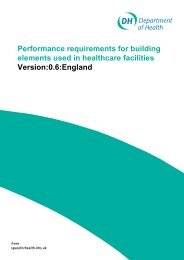Early Life Nutrition and Lifelong Health - Derbyshire Local Medical ...
Early Life Nutrition and Lifelong Health - Derbyshire Local Medical ...
Early Life Nutrition and Lifelong Health - Derbyshire Local Medical ...
Create successful ePaper yourself
Turn your PDF publications into a flip-book with our unique Google optimized e-Paper software.
BMA Board of ScienceThere is little evidence that adding probiotics (live non-pathogenic bacteria that colonise the gut) orprebiotics (nondigestible food components such as oligosaccharides that stimulate the growth of221, 222non-pathogenic bacteria in the gut) to infant feeds reduces later food allergy/intolerance.Infant growth <strong>and</strong> long-term outcomesThere is strong <strong>and</strong> consistent evidence that undernutrition in infancy is associated with permanentadverse effects on growth <strong>and</strong> development. In a recent analysis of young adults from fivedeveloping countries, stunting <strong>and</strong>/or underweight at the age of two years were associated withreduced adult height, fewer years of attained schooling <strong>and</strong> lower adult income or assets. 19 Amongwomen, undernutrition in infancy was associated with lower birth weight in the next generation.These relationships remained after adjustment for childhood socio-economic status <strong>and</strong> parentaleducation, suggesting that they were related to infant undernutrition, rather than simply areflection of continuing disadvantage in later life. A literature review also found consistentevidence of impaired cognitive ability in children who had been undernourished (stunted orwasted) in infancy. 19Key messageThere is strong <strong>and</strong> consistent evidence that poor weight gain <strong>and</strong> growth during infancy areassociated with permanent stunting <strong>and</strong> cognitive impairment, resulting in fewer years ofattained education, <strong>and</strong> lower adult productivity <strong>and</strong> earning capacity.The relationship of infant size <strong>and</strong> growth to later health outcomes in well-nourished populationsis currently unclear <strong>and</strong> controversial. This is partly because of a paucity of data. Cohort studies oldenough to hold data on both infant size <strong>and</strong> adult disease are few. In a recent systematic reviewrelating size in infancy to the 12 diseases accounting for the highest burden of disease (ischaemicheart disease, stroke, depression, lung cancer, road traffic accidents, alcohol abuse, dementia,chronic obstructive lung disease, suicide, breast cancer <strong>and</strong> diabetes (split into type 1 <strong>and</strong> type 2))only 19 good quality studies, relating to 10 of the disease outcomes, were found. 223 The highestnumber of studies for a single disease was seven for type 1 diabetes, a disease with its onsetmainly in childhood. Three of these seven studies showed a positive association between infantweight or BMI <strong>and</strong> type 1 diabetes risk. This is consistent with the data described previouslyshowing a lower risk of type 1 diabetes in children who were breastfed (see page 42).Several studies of cardiovascular risk factors in children have shown higher blood pressure in thosewho gained more weight during infancy. 224, 225 In non-r<strong>and</strong>omised analyses of Lucas’s infant feedingtrials, SGA babies who gained more weight between birth <strong>and</strong> nine months had higher diastolicblood pressure in childhood 213 <strong>and</strong> pre-term babies who gained more weight in the first two weekshad higher 32-33 split proinsulin concentrations <strong>and</strong> LDL/HDL ratios at 13-16 years. 202, 212 Greaterweight gain in infancy is consistently associated with higher BMI, <strong>and</strong> in some but not all studieswith greater adiposity, in later childhood <strong>and</strong> in adult life. 19, 226-228 These studies have led to theGrowth Acceleration Hypothesis, 229 which suggests that rapid weight gain in infancy, as well as inlater childhood, is a risk factor for later cardiovascular disease.In marked contrast to these data, retrospective studies of adult cohorts suggest benefits of infantweight gain. In the Hertfordshire cohort, men with a higher weight at one year had lowercardiovascular disease mortality (see Figure 12) 47, 230, 231 <strong>and</strong> were less likely to have impairedglucose tolerance or type 2 diabetes. 232 Men <strong>and</strong> women in Finl<strong>and</strong> who developed CHD or type 2<strong>Early</strong> life nutrition <strong>and</strong> lifelong health 45



